Financial Rewards and Incentives in Organizational Behavior
VerifiedAdded on 2023/06/09
|7
|2095
|302
AI Summary
This article discusses the pros and cons of financial rewards and incentives in organizational behavior. It covers how monetary incentives can motivate employees, improve productivity, and create a positive work environment. It also highlights the negative impacts of financial rewards, such as creating inequality and discouraging teamwork.
Contribute Materials
Your contribution can guide someone’s learning journey. Share your
documents today.
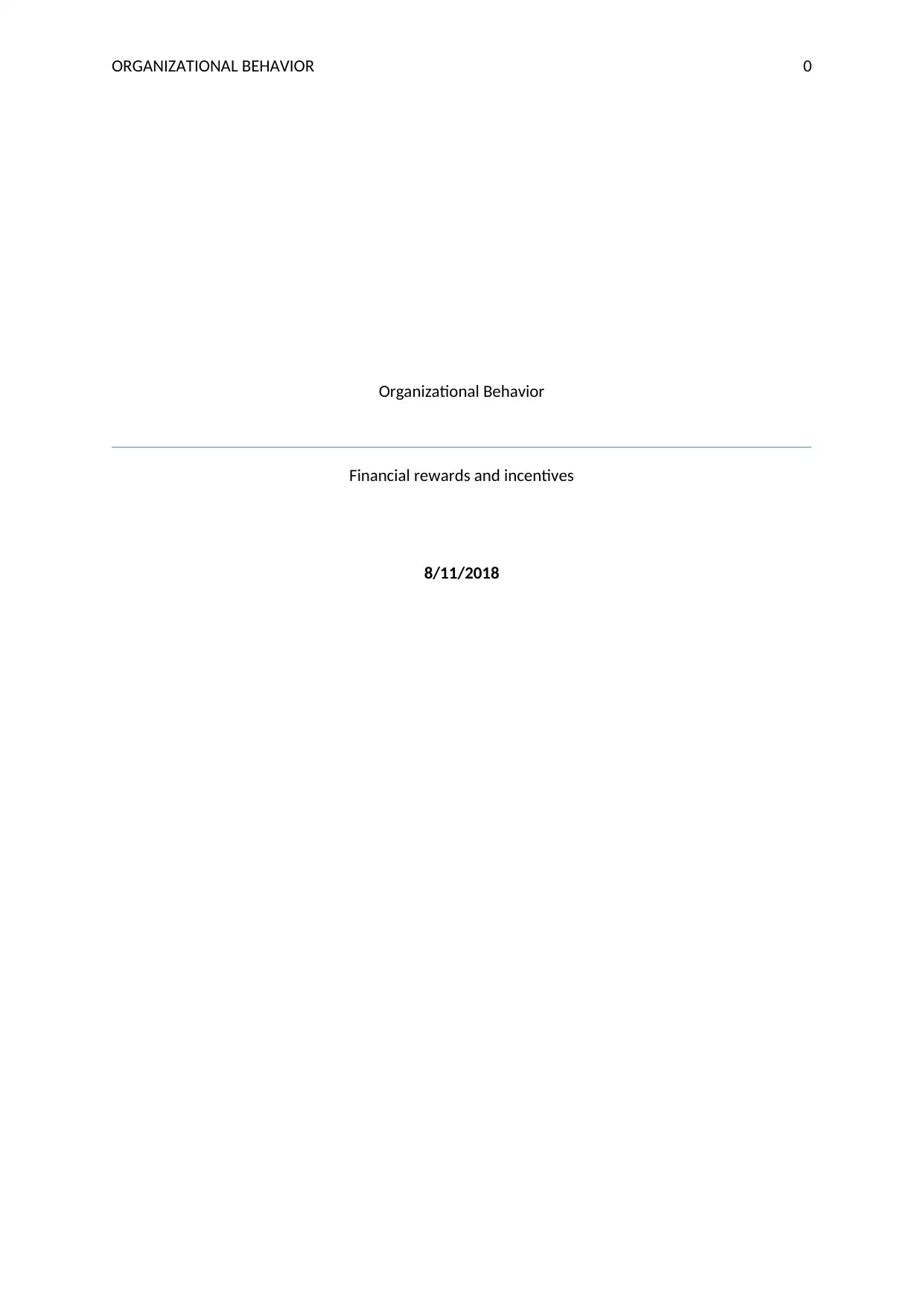
ORGANIZATIONAL BEHAVIOR 0
Organizational Behavior
Financial rewards and incentives
8/11/2018
Organizational Behavior
Financial rewards and incentives
8/11/2018
Secure Best Marks with AI Grader
Need help grading? Try our AI Grader for instant feedback on your assignments.
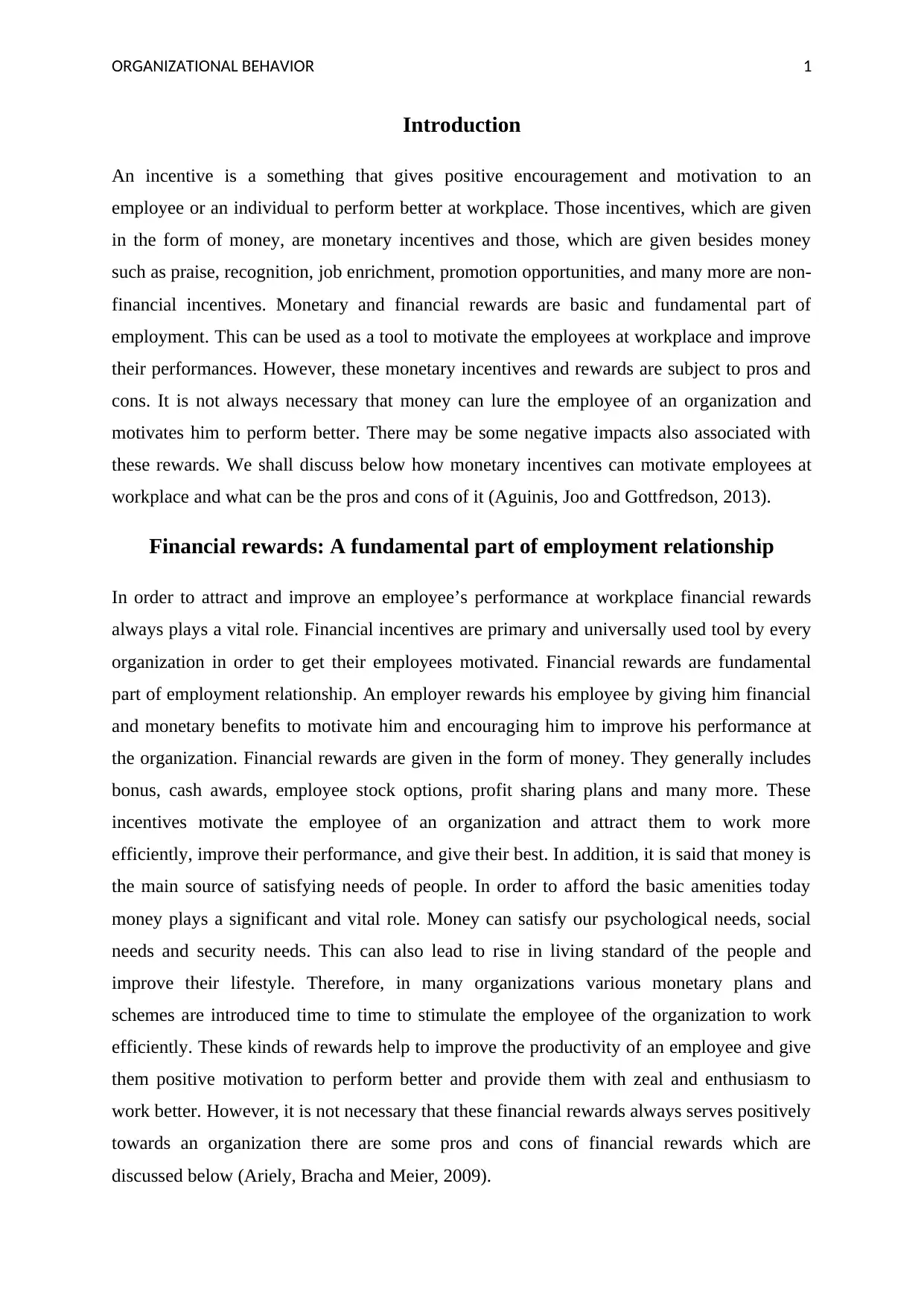
ORGANIZATIONAL BEHAVIOR 1
Introduction
An incentive is a something that gives positive encouragement and motivation to an
employee or an individual to perform better at workplace. Those incentives, which are given
in the form of money, are monetary incentives and those, which are given besides money
such as praise, recognition, job enrichment, promotion opportunities, and many more are non-
financial incentives. Monetary and financial rewards are basic and fundamental part of
employment. This can be used as a tool to motivate the employees at workplace and improve
their performances. However, these monetary incentives and rewards are subject to pros and
cons. It is not always necessary that money can lure the employee of an organization and
motivates him to perform better. There may be some negative impacts also associated with
these rewards. We shall discuss below how monetary incentives can motivate employees at
workplace and what can be the pros and cons of it (Aguinis, Joo and Gottfredson, 2013).
Financial rewards: A fundamental part of employment relationship
In order to attract and improve an employee’s performance at workplace financial rewards
always plays a vital role. Financial incentives are primary and universally used tool by every
organization in order to get their employees motivated. Financial rewards are fundamental
part of employment relationship. An employer rewards his employee by giving him financial
and monetary benefits to motivate him and encouraging him to improve his performance at
the organization. Financial rewards are given in the form of money. They generally includes
bonus, cash awards, employee stock options, profit sharing plans and many more. These
incentives motivate the employee of an organization and attract them to work more
efficiently, improve their performance, and give their best. In addition, it is said that money is
the main source of satisfying needs of people. In order to afford the basic amenities today
money plays a significant and vital role. Money can satisfy our psychological needs, social
needs and security needs. This can also lead to rise in living standard of the people and
improve their lifestyle. Therefore, in many organizations various monetary plans and
schemes are introduced time to time to stimulate the employee of the organization to work
efficiently. These kinds of rewards help to improve the productivity of an employee and give
them positive motivation to perform better and provide them with zeal and enthusiasm to
work better. However, it is not necessary that these financial rewards always serves positively
towards an organization there are some pros and cons of financial rewards which are
discussed below (Ariely, Bracha and Meier, 2009).
Introduction
An incentive is a something that gives positive encouragement and motivation to an
employee or an individual to perform better at workplace. Those incentives, which are given
in the form of money, are monetary incentives and those, which are given besides money
such as praise, recognition, job enrichment, promotion opportunities, and many more are non-
financial incentives. Monetary and financial rewards are basic and fundamental part of
employment. This can be used as a tool to motivate the employees at workplace and improve
their performances. However, these monetary incentives and rewards are subject to pros and
cons. It is not always necessary that money can lure the employee of an organization and
motivates him to perform better. There may be some negative impacts also associated with
these rewards. We shall discuss below how monetary incentives can motivate employees at
workplace and what can be the pros and cons of it (Aguinis, Joo and Gottfredson, 2013).
Financial rewards: A fundamental part of employment relationship
In order to attract and improve an employee’s performance at workplace financial rewards
always plays a vital role. Financial incentives are primary and universally used tool by every
organization in order to get their employees motivated. Financial rewards are fundamental
part of employment relationship. An employer rewards his employee by giving him financial
and monetary benefits to motivate him and encouraging him to improve his performance at
the organization. Financial rewards are given in the form of money. They generally includes
bonus, cash awards, employee stock options, profit sharing plans and many more. These
incentives motivate the employee of an organization and attract them to work more
efficiently, improve their performance, and give their best. In addition, it is said that money is
the main source of satisfying needs of people. In order to afford the basic amenities today
money plays a significant and vital role. Money can satisfy our psychological needs, social
needs and security needs. This can also lead to rise in living standard of the people and
improve their lifestyle. Therefore, in many organizations various monetary plans and
schemes are introduced time to time to stimulate the employee of the organization to work
efficiently. These kinds of rewards help to improve the productivity of an employee and give
them positive motivation to perform better and provide them with zeal and enthusiasm to
work better. However, it is not necessary that these financial rewards always serves positively
towards an organization there are some pros and cons of financial rewards which are
discussed below (Ariely, Bracha and Meier, 2009).
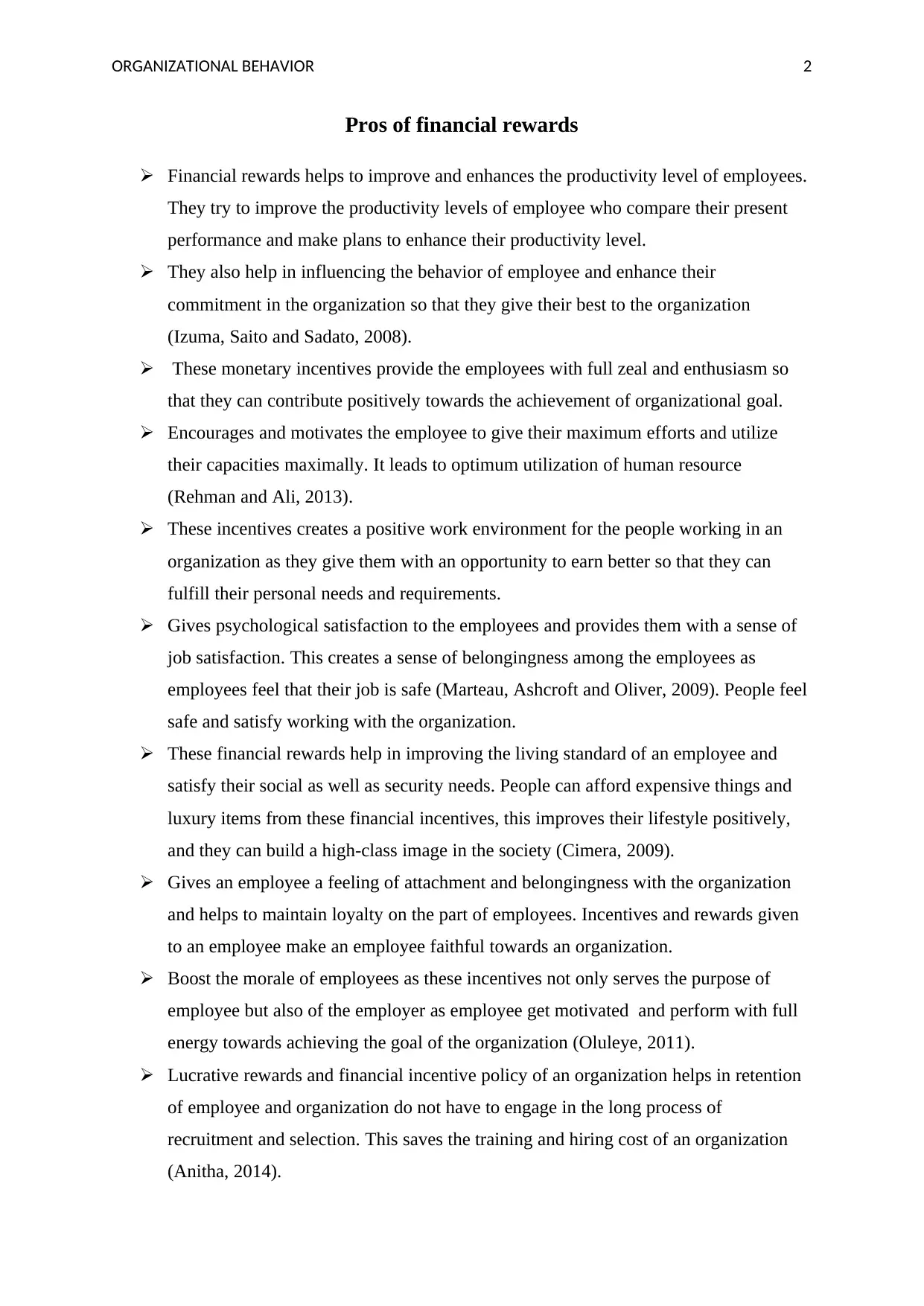
ORGANIZATIONAL BEHAVIOR 2
Pros of financial rewards
Financial rewards helps to improve and enhances the productivity level of employees.
They try to improve the productivity levels of employee who compare their present
performance and make plans to enhance their productivity level.
They also help in influencing the behavior of employee and enhance their
commitment in the organization so that they give their best to the organization
(Izuma, Saito and Sadato, 2008).
These monetary incentives provide the employees with full zeal and enthusiasm so
that they can contribute positively towards the achievement of organizational goal.
Encourages and motivates the employee to give their maximum efforts and utilize
their capacities maximally. It leads to optimum utilization of human resource
(Rehman and Ali, 2013).
These incentives creates a positive work environment for the people working in an
organization as they give them with an opportunity to earn better so that they can
fulfill their personal needs and requirements.
Gives psychological satisfaction to the employees and provides them with a sense of
job satisfaction. This creates a sense of belongingness among the employees as
employees feel that their job is safe (Marteau, Ashcroft and Oliver, 2009). People feel
safe and satisfy working with the organization.
These financial rewards help in improving the living standard of an employee and
satisfy their social as well as security needs. People can afford expensive things and
luxury items from these financial incentives, this improves their lifestyle positively,
and they can build a high-class image in the society (Cimera, 2009).
Gives an employee a feeling of attachment and belongingness with the organization
and helps to maintain loyalty on the part of employees. Incentives and rewards given
to an employee make an employee faithful towards an organization.
Boost the morale of employees as these incentives not only serves the purpose of
employee but also of the employer as employee get motivated and perform with full
energy towards achieving the goal of the organization (Oluleye, 2011).
Lucrative rewards and financial incentive policy of an organization helps in retention
of employee and organization do not have to engage in the long process of
recruitment and selection. This saves the training and hiring cost of an organization
(Anitha, 2014).
Pros of financial rewards
Financial rewards helps to improve and enhances the productivity level of employees.
They try to improve the productivity levels of employee who compare their present
performance and make plans to enhance their productivity level.
They also help in influencing the behavior of employee and enhance their
commitment in the organization so that they give their best to the organization
(Izuma, Saito and Sadato, 2008).
These monetary incentives provide the employees with full zeal and enthusiasm so
that they can contribute positively towards the achievement of organizational goal.
Encourages and motivates the employee to give their maximum efforts and utilize
their capacities maximally. It leads to optimum utilization of human resource
(Rehman and Ali, 2013).
These incentives creates a positive work environment for the people working in an
organization as they give them with an opportunity to earn better so that they can
fulfill their personal needs and requirements.
Gives psychological satisfaction to the employees and provides them with a sense of
job satisfaction. This creates a sense of belongingness among the employees as
employees feel that their job is safe (Marteau, Ashcroft and Oliver, 2009). People feel
safe and satisfy working with the organization.
These financial rewards help in improving the living standard of an employee and
satisfy their social as well as security needs. People can afford expensive things and
luxury items from these financial incentives, this improves their lifestyle positively,
and they can build a high-class image in the society (Cimera, 2009).
Gives an employee a feeling of attachment and belongingness with the organization
and helps to maintain loyalty on the part of employees. Incentives and rewards given
to an employee make an employee faithful towards an organization.
Boost the morale of employees as these incentives not only serves the purpose of
employee but also of the employer as employee get motivated and perform with full
energy towards achieving the goal of the organization (Oluleye, 2011).
Lucrative rewards and financial incentive policy of an organization helps in retention
of employee and organization do not have to engage in the long process of
recruitment and selection. This saves the training and hiring cost of an organization
(Anitha, 2014).
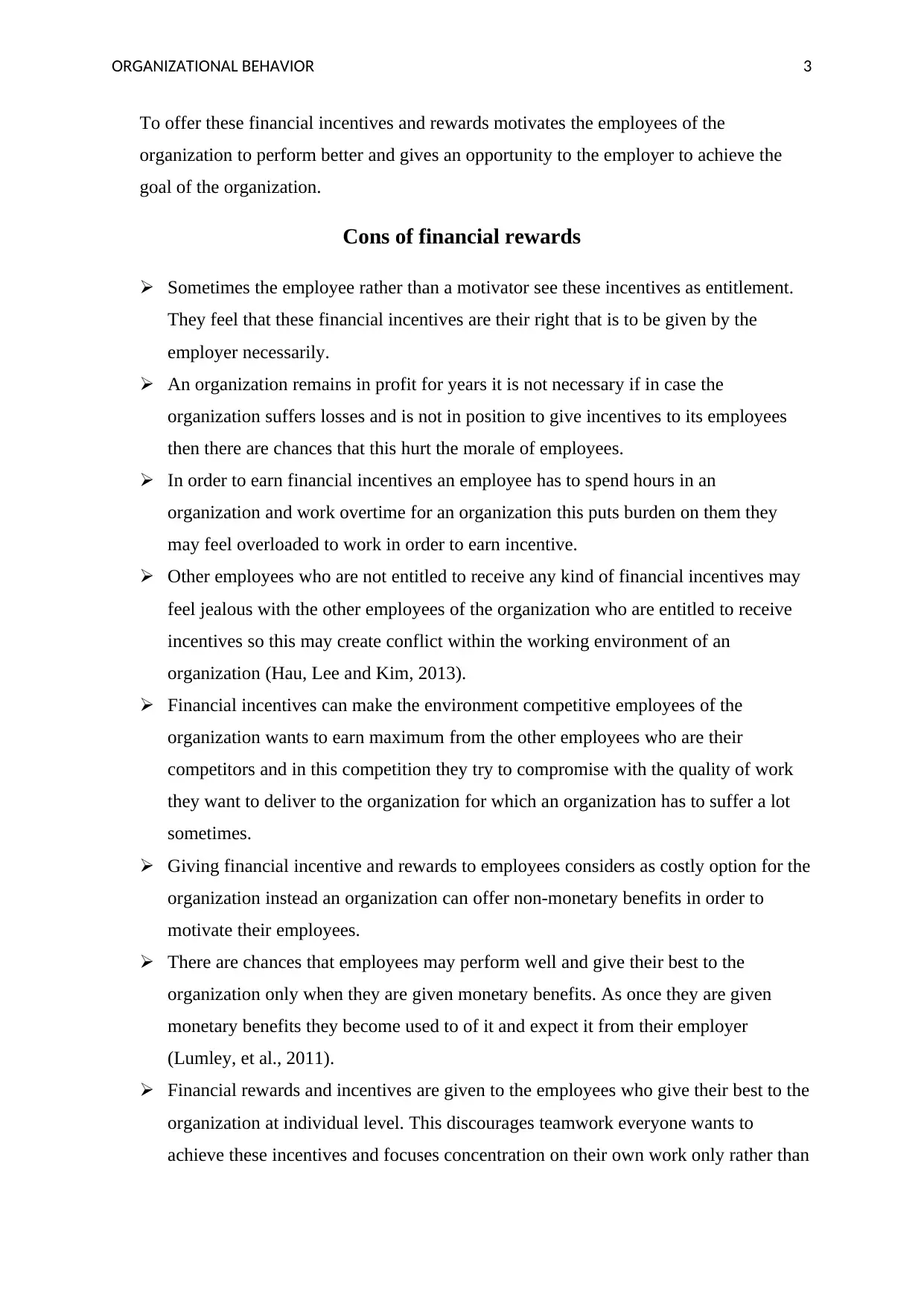
ORGANIZATIONAL BEHAVIOR 3
To offer these financial incentives and rewards motivates the employees of the
organization to perform better and gives an opportunity to the employer to achieve the
goal of the organization.
Cons of financial rewards
Sometimes the employee rather than a motivator see these incentives as entitlement.
They feel that these financial incentives are their right that is to be given by the
employer necessarily.
An organization remains in profit for years it is not necessary if in case the
organization suffers losses and is not in position to give incentives to its employees
then there are chances that this hurt the morale of employees.
In order to earn financial incentives an employee has to spend hours in an
organization and work overtime for an organization this puts burden on them they
may feel overloaded to work in order to earn incentive.
Other employees who are not entitled to receive any kind of financial incentives may
feel jealous with the other employees of the organization who are entitled to receive
incentives so this may create conflict within the working environment of an
organization (Hau, Lee and Kim, 2013).
Financial incentives can make the environment competitive employees of the
organization wants to earn maximum from the other employees who are their
competitors and in this competition they try to compromise with the quality of work
they want to deliver to the organization for which an organization has to suffer a lot
sometimes.
Giving financial incentive and rewards to employees considers as costly option for the
organization instead an organization can offer non-monetary benefits in order to
motivate their employees.
There are chances that employees may perform well and give their best to the
organization only when they are given monetary benefits. As once they are given
monetary benefits they become used to of it and expect it from their employer
(Lumley, et al., 2011).
Financial rewards and incentives are given to the employees who give their best to the
organization at individual level. This discourages teamwork everyone wants to
achieve these incentives and focuses concentration on their own work only rather than
To offer these financial incentives and rewards motivates the employees of the
organization to perform better and gives an opportunity to the employer to achieve the
goal of the organization.
Cons of financial rewards
Sometimes the employee rather than a motivator see these incentives as entitlement.
They feel that these financial incentives are their right that is to be given by the
employer necessarily.
An organization remains in profit for years it is not necessary if in case the
organization suffers losses and is not in position to give incentives to its employees
then there are chances that this hurt the morale of employees.
In order to earn financial incentives an employee has to spend hours in an
organization and work overtime for an organization this puts burden on them they
may feel overloaded to work in order to earn incentive.
Other employees who are not entitled to receive any kind of financial incentives may
feel jealous with the other employees of the organization who are entitled to receive
incentives so this may create conflict within the working environment of an
organization (Hau, Lee and Kim, 2013).
Financial incentives can make the environment competitive employees of the
organization wants to earn maximum from the other employees who are their
competitors and in this competition they try to compromise with the quality of work
they want to deliver to the organization for which an organization has to suffer a lot
sometimes.
Giving financial incentive and rewards to employees considers as costly option for the
organization instead an organization can offer non-monetary benefits in order to
motivate their employees.
There are chances that employees may perform well and give their best to the
organization only when they are given monetary benefits. As once they are given
monetary benefits they become used to of it and expect it from their employer
(Lumley, et al., 2011).
Financial rewards and incentives are given to the employees who give their best to the
organization at individual level. This discourages teamwork everyone wants to
achieve these incentives and focuses concentration on their own work only rather than
Secure Best Marks with AI Grader
Need help grading? Try our AI Grader for instant feedback on your assignments.
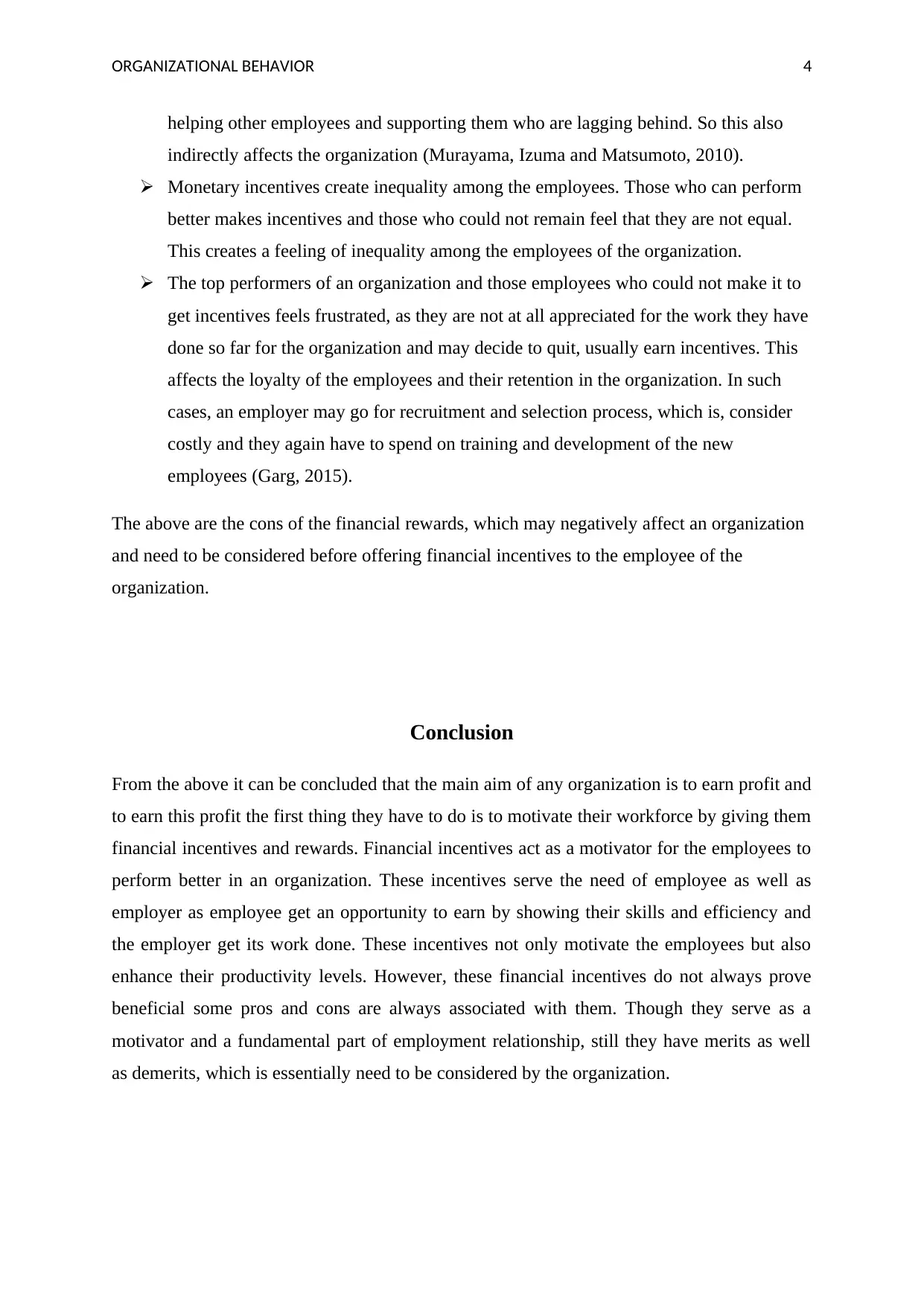
ORGANIZATIONAL BEHAVIOR 4
helping other employees and supporting them who are lagging behind. So this also
indirectly affects the organization (Murayama, Izuma and Matsumoto, 2010).
Monetary incentives create inequality among the employees. Those who can perform
better makes incentives and those who could not remain feel that they are not equal.
This creates a feeling of inequality among the employees of the organization.
The top performers of an organization and those employees who could not make it to
get incentives feels frustrated, as they are not at all appreciated for the work they have
done so far for the organization and may decide to quit, usually earn incentives. This
affects the loyalty of the employees and their retention in the organization. In such
cases, an employer may go for recruitment and selection process, which is, consider
costly and they again have to spend on training and development of the new
employees (Garg, 2015).
The above are the cons of the financial rewards, which may negatively affect an organization
and need to be considered before offering financial incentives to the employee of the
organization.
Conclusion
From the above it can be concluded that the main aim of any organization is to earn profit and
to earn this profit the first thing they have to do is to motivate their workforce by giving them
financial incentives and rewards. Financial incentives act as a motivator for the employees to
perform better in an organization. These incentives serve the need of employee as well as
employer as employee get an opportunity to earn by showing their skills and efficiency and
the employer get its work done. These incentives not only motivate the employees but also
enhance their productivity levels. However, these financial incentives do not always prove
beneficial some pros and cons are always associated with them. Though they serve as a
motivator and a fundamental part of employment relationship, still they have merits as well
as demerits, which is essentially need to be considered by the organization.
helping other employees and supporting them who are lagging behind. So this also
indirectly affects the organization (Murayama, Izuma and Matsumoto, 2010).
Monetary incentives create inequality among the employees. Those who can perform
better makes incentives and those who could not remain feel that they are not equal.
This creates a feeling of inequality among the employees of the organization.
The top performers of an organization and those employees who could not make it to
get incentives feels frustrated, as they are not at all appreciated for the work they have
done so far for the organization and may decide to quit, usually earn incentives. This
affects the loyalty of the employees and their retention in the organization. In such
cases, an employer may go for recruitment and selection process, which is, consider
costly and they again have to spend on training and development of the new
employees (Garg, 2015).
The above are the cons of the financial rewards, which may negatively affect an organization
and need to be considered before offering financial incentives to the employee of the
organization.
Conclusion
From the above it can be concluded that the main aim of any organization is to earn profit and
to earn this profit the first thing they have to do is to motivate their workforce by giving them
financial incentives and rewards. Financial incentives act as a motivator for the employees to
perform better in an organization. These incentives serve the need of employee as well as
employer as employee get an opportunity to earn by showing their skills and efficiency and
the employer get its work done. These incentives not only motivate the employees but also
enhance their productivity levels. However, these financial incentives do not always prove
beneficial some pros and cons are always associated with them. Though they serve as a
motivator and a fundamental part of employment relationship, still they have merits as well
as demerits, which is essentially need to be considered by the organization.
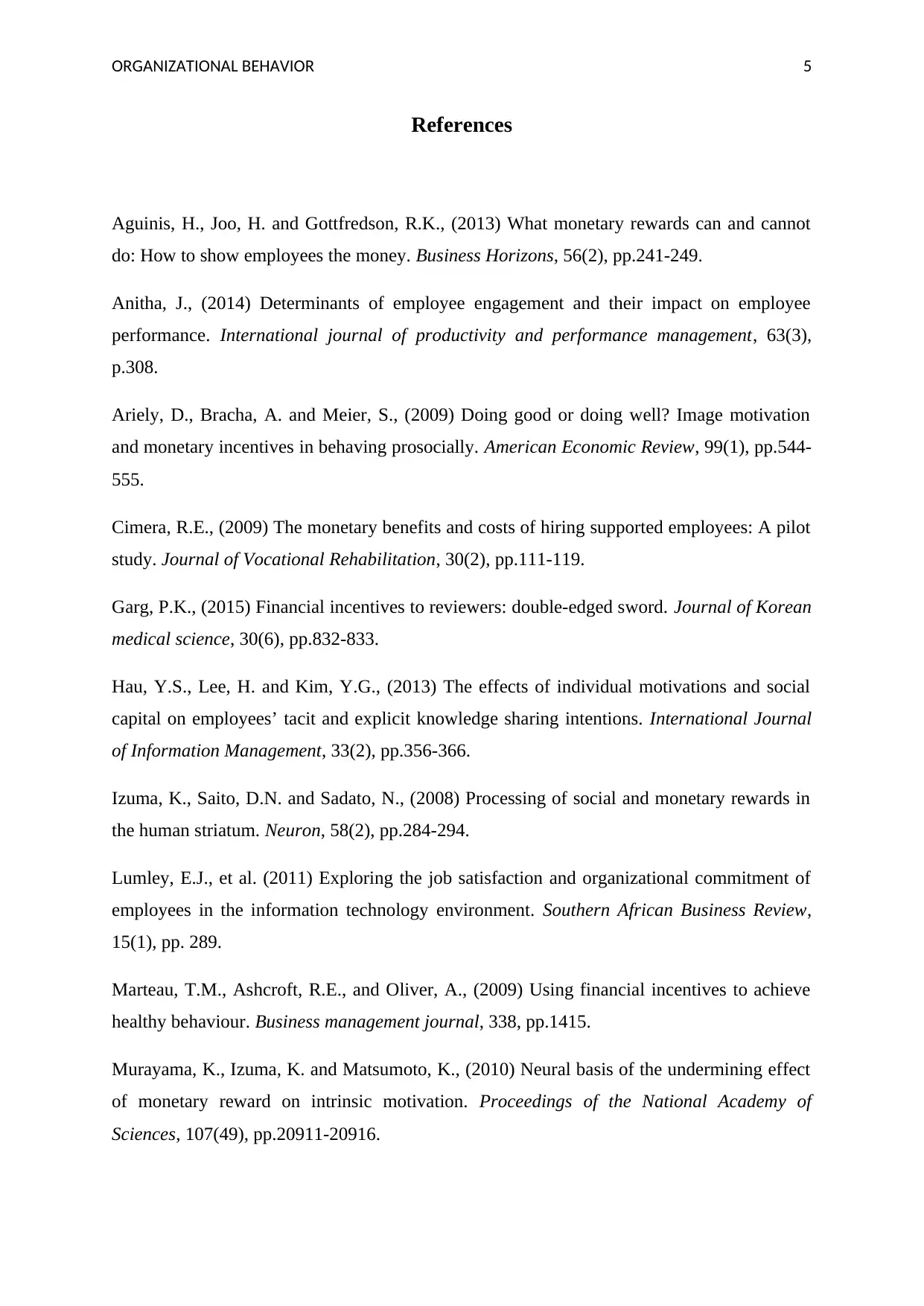
ORGANIZATIONAL BEHAVIOR 5
References
Aguinis, H., Joo, H. and Gottfredson, R.K., (2013) What monetary rewards can and cannot
do: How to show employees the money. Business Horizons, 56(2), pp.241-249.
Anitha, J., (2014) Determinants of employee engagement and their impact on employee
performance. International journal of productivity and performance management, 63(3),
p.308.
Ariely, D., Bracha, A. and Meier, S., (2009) Doing good or doing well? Image motivation
and monetary incentives in behaving prosocially. American Economic Review, 99(1), pp.544-
555.
Cimera, R.E., (2009) The monetary benefits and costs of hiring supported employees: A pilot
study. Journal of Vocational Rehabilitation, 30(2), pp.111-119.
Garg, P.K., (2015) Financial incentives to reviewers: double-edged sword. Journal of Korean
medical science, 30(6), pp.832-833.
Hau, Y.S., Lee, H. and Kim, Y.G., (2013) The effects of individual motivations and social
capital on employees’ tacit and explicit knowledge sharing intentions. International Journal
of Information Management, 33(2), pp.356-366.
Izuma, K., Saito, D.N. and Sadato, N., (2008) Processing of social and monetary rewards in
the human striatum. Neuron, 58(2), pp.284-294.
Lumley, E.J., et al. (2011) Exploring the job satisfaction and organizational commitment of
employees in the information technology environment. Southern African Business Review,
15(1), pp. 289.
Marteau, T.M., Ashcroft, R.E., and Oliver, A., (2009) Using financial incentives to achieve
healthy behaviour. Business management journal, 338, pp.1415.
Murayama, K., Izuma, K. and Matsumoto, K., (2010) Neural basis of the undermining effect
of monetary reward on intrinsic motivation. Proceedings of the National Academy of
Sciences, 107(49), pp.20911-20916.
References
Aguinis, H., Joo, H. and Gottfredson, R.K., (2013) What monetary rewards can and cannot
do: How to show employees the money. Business Horizons, 56(2), pp.241-249.
Anitha, J., (2014) Determinants of employee engagement and their impact on employee
performance. International journal of productivity and performance management, 63(3),
p.308.
Ariely, D., Bracha, A. and Meier, S., (2009) Doing good or doing well? Image motivation
and monetary incentives in behaving prosocially. American Economic Review, 99(1), pp.544-
555.
Cimera, R.E., (2009) The monetary benefits and costs of hiring supported employees: A pilot
study. Journal of Vocational Rehabilitation, 30(2), pp.111-119.
Garg, P.K., (2015) Financial incentives to reviewers: double-edged sword. Journal of Korean
medical science, 30(6), pp.832-833.
Hau, Y.S., Lee, H. and Kim, Y.G., (2013) The effects of individual motivations and social
capital on employees’ tacit and explicit knowledge sharing intentions. International Journal
of Information Management, 33(2), pp.356-366.
Izuma, K., Saito, D.N. and Sadato, N., (2008) Processing of social and monetary rewards in
the human striatum. Neuron, 58(2), pp.284-294.
Lumley, E.J., et al. (2011) Exploring the job satisfaction and organizational commitment of
employees in the information technology environment. Southern African Business Review,
15(1), pp. 289.
Marteau, T.M., Ashcroft, R.E., and Oliver, A., (2009) Using financial incentives to achieve
healthy behaviour. Business management journal, 338, pp.1415.
Murayama, K., Izuma, K. and Matsumoto, K., (2010) Neural basis of the undermining effect
of monetary reward on intrinsic motivation. Proceedings of the National Academy of
Sciences, 107(49), pp.20911-20916.
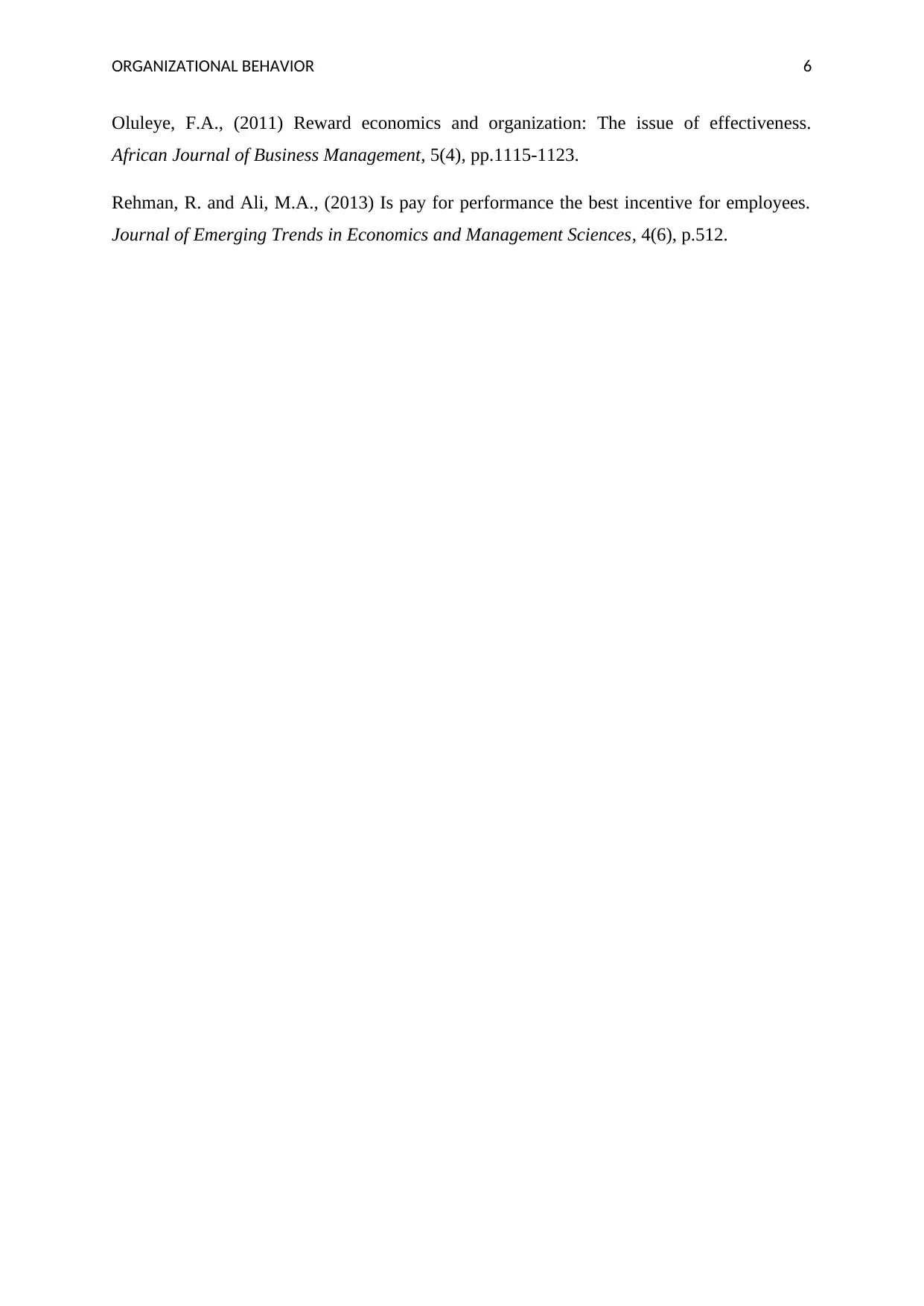
ORGANIZATIONAL BEHAVIOR 6
Oluleye, F.A., (2011) Reward economics and organization: The issue of effectiveness.
African Journal of Business Management, 5(4), pp.1115-1123.
Rehman, R. and Ali, M.A., (2013) Is pay for performance the best incentive for employees.
Journal of Emerging Trends in Economics and Management Sciences, 4(6), p.512.
Oluleye, F.A., (2011) Reward economics and organization: The issue of effectiveness.
African Journal of Business Management, 5(4), pp.1115-1123.
Rehman, R. and Ali, M.A., (2013) Is pay for performance the best incentive for employees.
Journal of Emerging Trends in Economics and Management Sciences, 4(6), p.512.
1 out of 7
Related Documents
Your All-in-One AI-Powered Toolkit for Academic Success.
+13062052269
info@desklib.com
Available 24*7 on WhatsApp / Email
![[object Object]](/_next/static/media/star-bottom.7253800d.svg)
Unlock your academic potential
© 2024 | Zucol Services PVT LTD | All rights reserved.





